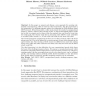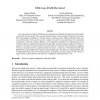464 search results - page 90 / 93 » Validating Attacks on Authentication Protocols |
ACSAC
2005
IEEE
14 years 1 months ago
2005
IEEE
As evidenced by the proliferation of phishing attacks and keystroke loggers, we know that human beings are not wellequipped to make trust decisions about when to use their passwor...
SP
2009
IEEE
14 years 2 months ago
2009
IEEE
– HTTPS is designed to provide secure web communications over insecure networks. The protocol itself has been rigorously designed and evaluated by assuming the network as an adve...
JUCS
2008
13 years 7 months ago
2008
Abstract: In this paper we present and discuss a new approach for securing multimedia communication, which is based on three innovations. The first innovation is the integration of...
SRDS
2007
IEEE
14 years 1 months ago
2007
IEEE
Fault tolerant distributed protocols typically utilize a homogeneous fault model, either fail-crash or fail-Byzantine, where all processors are assumed to fail in the same manner....
CRYPTO
2010
Springer
13 years 8 months ago
2010
Springer
We reinvestigate the oblivious RAM concept introduced by Goldreich and Ostrovsky, which enables a client, that can store locally only a constant amount of data, to store remotely ...


